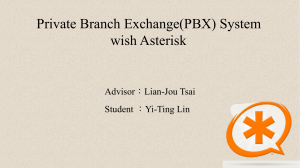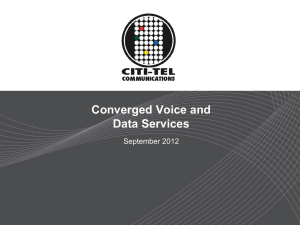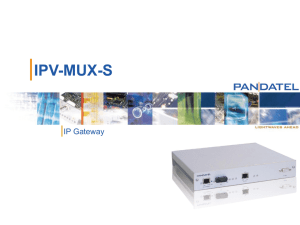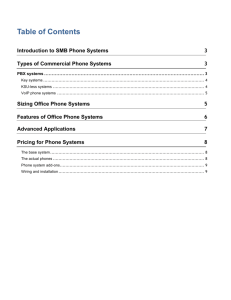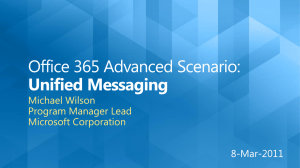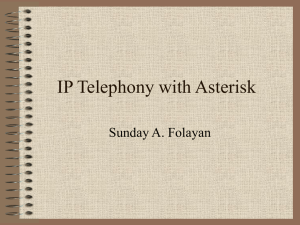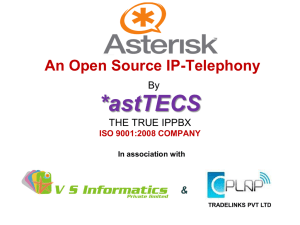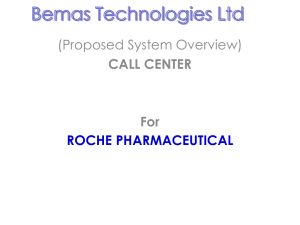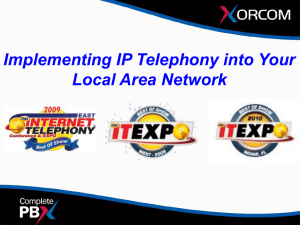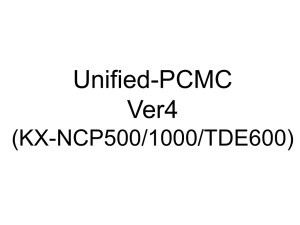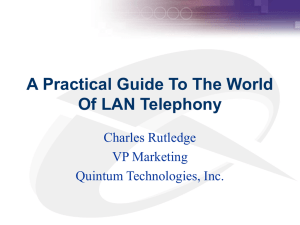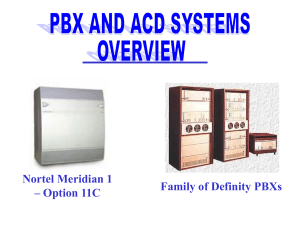Lines, Trunks, PBX, and Key Telephone Systems
advertisement
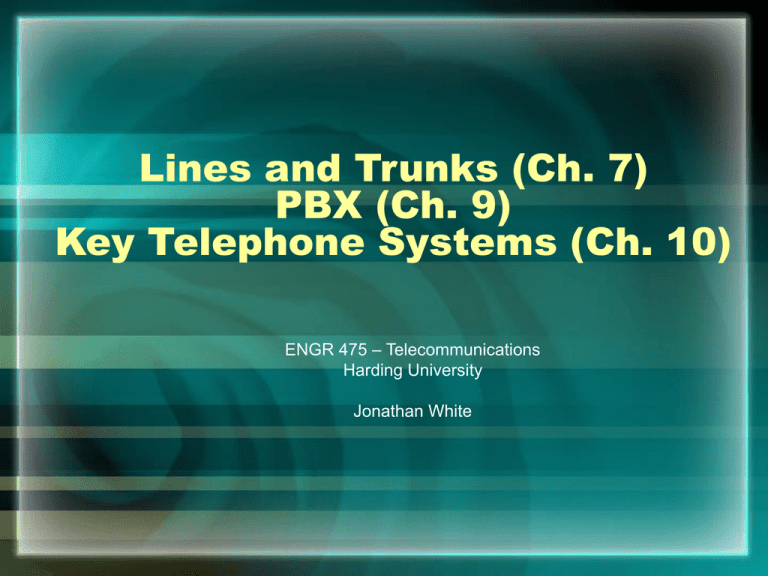
Lines and Trunks (Ch. 7) PBX (Ch. 9) Key Telephone Systems (Ch. 10) ENGR 475 – Telecommunications Harding University Jonathan White Lines • End Point – End in terminals (telephones, modems, faxes) – New term: FX0 – Foreign Exchange Office • Connection to analog POTS – 2 wire, typically analog – Called DS-0 – 64 Kbps – Nothing special Trunks • Connection between points – Carry many lines – Connects 2 intelligent switching systems • PBX/Centrex/CO – Digital – Multiplexed – Expensive DID • Direct Inward Dialing – Everyone has their own unique telephone number at a business – However, you don’t have enough incoming/outgoing lines to support all users at once. • Handled by the PBX (routing) • You don’t have to go through an operator. DOD • Direct Outward Dialing • Again, you don’t have to go through an operator. • Handled by the PBX WATS • Wide Area telephone service • Same thing as 800/888/877/866 service • A way to reduce long distance costs PBX - Review • Private Branch Exchange – Owned by an individual company – Performs call routing and switching – Allows the business to save money because not as many connections to the PSTN are provided. – Keeps calls between employees internal to the network. • How many lines would a call between employees normally use? PBX - Review • How does the individual telephone numbers within a PBX system work? – Takes the cooperation of the Telco and the organization. • Some trunks can be dedicated strictly to Direct Inward Dialing. • Page 179 graphic PBX Functions • • • • • • • • • • DID / DOD Auto Attendant Call transfer Speed Dialing Voice mail Follow-me Call forwarding on absence Call forwarding on busy Music on hold Automatic ring back PBX Functions • • • • • • • • • • Night service Automatic call distributor Call waiting Call pick-up Call park Conference call Call accounting Voice paging (PA system) Custom greetings Shared message boxes PBX Cost • http://cgi.ebay.com/NEW-SOHO-PBX-PABX-AUTOMATED-PHONEEXCHANGE-4-x16_W0QQitemZ230023614851QQihZ013QQcategoryZ11908QQrdZ1QQcmd ZViewItem • • • Can be found cheaply Others can be very expensive Installation and maintenance can be expensive Asterisk • Open source implementation of a PBX • Runs on Windows/Linux/UNIX and performs all the features of a proprietary PBX: – DID/DOD, voice mail, conference calling, interactive voice response (phone menus), and automatic call distribution. • Runs on a standard desktop computer – Needs a special PCI card to attach to the PSTN or other analog phones (a modem will not work). Asterisk • Can also be used to run a VOIP network with connections to the PSTN • With VOIP, this can be incredibly cheap. Asterisk PCI card Asterisk PCI Cards • PCI cards exist in several flavors: – 1 inward/outward phone line ($20) – 2 inward/outward ($225) – 4 inward/outward ($380) – T1 connection (24 inward/outward) ($890) • Very comparable in price to the cheapest of proprietary PBX’s Asterisk Analog PCI Hubs • Act as the Main Distribution Frames – Kind of like a router or hub • Allow the users of analog telephones to connect to the PBX server • Necessary if you want to run a non VOIP network • Cost: 12 port ($1400) – Not many people actually run analog Asterisk • http://www.voicetronix.com/hda.htm#features Non PCI Switches • Called Channel Banks • Connects many phone lines to 1 main trunk • Not incredibly expensive. • Provide the multiplexing/demultiplexing Channel Banks VOIP Asterisk • If the PBX is already running digitally, why not run digital phones using VOIP? – Phones can be computers – Or special VOIP phones • Instead of buying a $1400 switch, you can buy an Ethernet switch for incredibly cheap. Skype • Allows computer to computer conversations that only cross the Internet. – There’s one main difference between Skype and Asterisk. • Skype is free or almost free. • Skype has very good security. Centrex • • • • Owned by the Telco Same features as a PBX Features are leased by businesses Each user has their own external phone line. PBX/Centrex Boxes Key Telephone Systems • Multi-line telephone system used in SMALL office environments • Very old technology • Similar to a PBX. • Many telephone lines come into certain phones. A light comes on if the line is busy. A user takes control of a line by pressing a button. Key Telephone Systems • Provided intercom capabilities. • Often 6, 12, or 25 lines would come into a phone. • In North America, these type of phones were known as 1A2. • They are still manufactured and supported today, though they are rapidly becoming outdated. Key Telephone Systems
